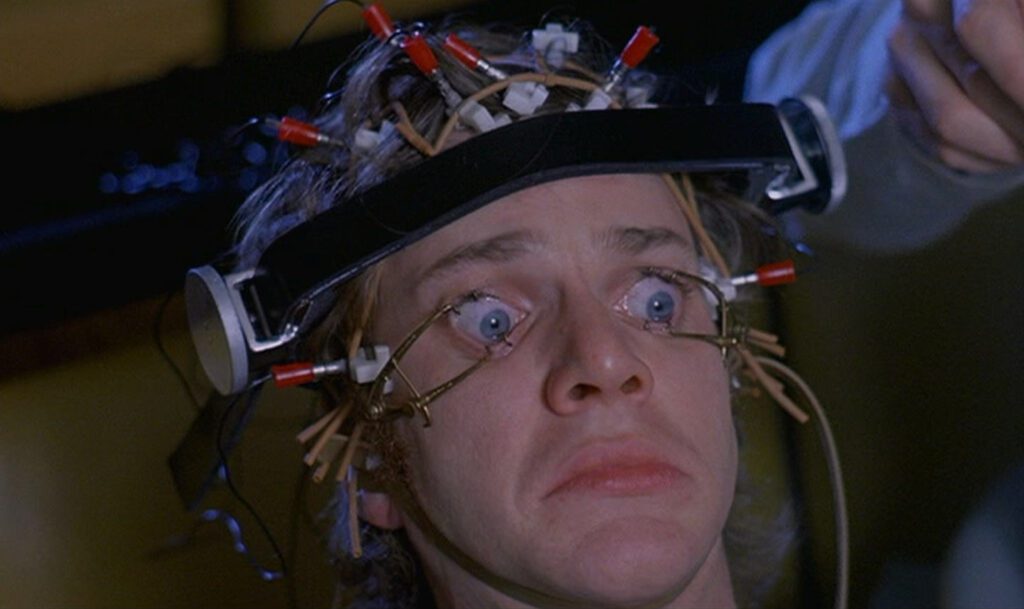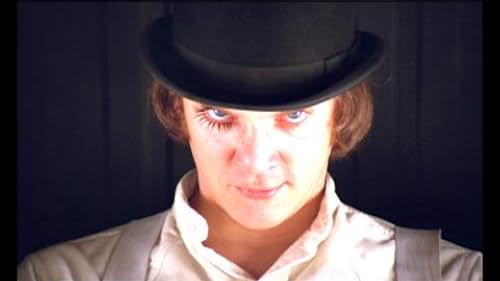🎬 A Clockwork Orange (1971)

🎬 A Clockwork Orange (1971)
Director: Stanley Kubrick
Studio: Warner Bros.
Genre: Crime, Drama, Sci-Fi
Running Time: 136 minutes
Rating: R
Release Date: December 19, 1971
Overview
A Clockwork Orange is a controversial and thought-provoking adaptation of Anthony Burgess’s novel of the same name, directed by Stanley Kubrick. Known for its striking visual style, disturbing content, and thought-provoking exploration of free will and social control, this film has become a cult classic. It’s a dark satire that blends violence with philosophical questions about the nature of humanity and society’s role in shaping behavior.
Plot Summary
Set in a dystopian future, A Clockwork Orange follows Alex DeLarge (Malcolm McDowell), a charismatic and sadistic teenage delinquent who leads a gang of similarly violent youths. The group spends their nights engaging in acts of vandalism, robbery, and violence. Alex’s life of crime takes a turn when he is betrayed by his friends and arrested after a brutal assault on a woman.
In prison, Alex volunteers to undergo an experimental treatment called Ludovico’s Technique, a form of aversion therapy designed to reform criminals by conditioning them to associate violent thoughts with intense feelings of nausea. The treatment strips him of his free will, turning him into a “clockwork orange”—something that appears organic but is, in reality, mechanized and controlled. Now unable to defend himself, Alex becomes a victim of the very society he once terrorized.
As he struggles with the loss of his autonomy, Alex faces the harsh consequences of a system that seeks to control human behavior, leaving him to question whether it’s better to choose to do evil than to have goodness imposed upon him.

Themes
- Free Will vs. Social Control: At its core, A Clockwork Orange is about the struggle between free will and the attempt by society to suppress individuality through control. Alex’s transformation into a docile and controlled individual raises questions about the nature of free will, the ethics of behavior modification, and whether it’s better to allow people to choose their own paths—even if those choices are violent—than to forcibly alter their behavior.
- Violence and Humanity: The film explores the idea that violence is a fundamental part of human nature. Kubrick doesn’t shy away from depicting brutal acts, but instead uses them to challenge viewers’ perceptions of morality and control. The line between victim and perpetrator becomes blurred as Alex becomes a victim of the system he once ruled over.
- The State and Individual Rights: A Clockwork Orange critiques both individual rebellion and governmental control, presenting the idea that societal structures often sacrifice individual freedom in the name of order and morality. The Ludovico treatment exemplifies the dehumanizing effects of institutions attempting to reform behavior in the name of social harmony.
- Identity and Transformation: Alex’s forced transformation is at the heart of the story. He loses the ability to act on his impulses, but in doing so, he also loses his sense of self. Kubrick paints a chilling picture of what happens when the state takes away personal choice, leaving individuals hollow shells of their former selves.
Characters and Performances
- Malcolm McDowell as Alex DeLarge delivers an iconic performance that combines charm and menace. McDowell’s portrayal of Alex is both captivating and repulsive, as he masterfully embodies a character who is both a victim of circumstance and an agent of violence. His performance is one of the most memorable in cinematic history, and he perfectly captures Alex’s evolution throughout the film.
- Patrick Magee plays Mr. Alexander, a writer whose wife is assaulted by Alex and becomes a symbol of the brokenness of society. Magee’s portrayal of a man pushed to the edge by injustice adds emotional depth to the film.
- Warren Clarke, Michael Tarn, and James Marcus are Alex’s friends, known as his “droogs.” Their performances contribute to the film’s sense of menace and instability, adding to the chaotic and unpredictable nature of Alex’s world.
- Adrienne Corri as Mrs. Alexander, the woman whose assault becomes the catalyst for Alex’s imprisonment, delivers a chilling performance that highlights the film’s stark contrasts between victimhood and powerlessness.

Direction and Cinematography
Stanley Kubrick’s direction is meticulous and highly stylized, using striking visuals and a surreal tone to elevate the film beyond just a crime drama. Kubrick famously uses symmetry, long tracking shots, and highly controlled compositions to create a sense of cold detachment, particularly during scenes of violence. His decision to present brutal acts in a clinical, almost detached manner forces the viewer to confront the content without emotional manipulation.
The cinematography by John Alcott is iconic, employing bold color contrasts, especially with the use of stark whites, blacks, and vibrant colors, creating a visually arresting experience. The film’s futuristic, almost sterile environments add to the sense of alienation and discomfort, underscoring the themes of control and loss of identity.
Music
The film’s music is one of its standout features, with a memorable score by Walter Carlos (now Wendy Carlos). The soundtrack features classical music, including pieces by Beethoven, which are used to striking effect throughout the film. Beethoven’s Ninth Symphony, in particular, is central to Alex’s character—he associates it with his violent outbursts, and later, the music takes on a more tragic significance as his treatment progresses. The juxtaposition of classical music with extreme violence enhances the surreal, unsettling tone of the film.

Controversy and Impact
Upon its release, A Clockwork Orange was met with controversy due to its graphic depiction of violence, sexual assault, and dark themes. The film sparked debates about its potential to incite violence in viewers, and Kubrick himself removed the film from British distribution after it was linked to a series of violent incidents. Despite this, the film garnered critical acclaim and became a touchstone for discussions on censorship, freedom of expression, and the role of media in society.
A Clockwork Orange has since become a cult classic, influencing countless films, music videos, and other works of art. Its impact is felt across genres, particularly in the sci-fi and dystopian genre, where its ideas about free will, control, and rebellion continue to resonate.
Conclusion
A Clockwork Orange is a visually arresting, thought-provoking film that pushes the boundaries of storytelling and social commentary. With its unsettling mix of dark humor, violence, and philosophical musings on human nature, Kubrick crafts a chilling portrayal of a dystopian world where the lines between victim and villain are often blurred.
The film is not for the faint of heart, but for those willing to engage with its deeper themes, it offers a profound exploration of free will, societal control, and the consequences of stripping away human agency. It remains one of Stanley Kubrick’s most important and controversial films, continuing to spark discussion and debate decades after its release.












